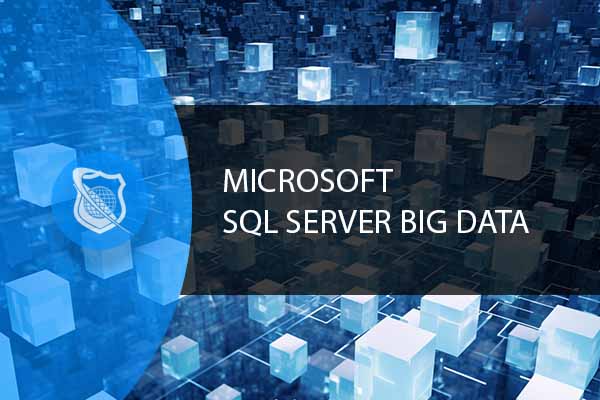Introduction to SQL Big Data & Analytics
Dive into the depths of SQL Server with this Microsoft SQL – SQL Big Data course and discover one of its most invaluable tools, SQL Big Data Clusters. Here, you will fully explore data virtualization and lakes in order to build a complete artificial intelligence (AI) and machine learning (ML) platform directly within the SQL Server database engine.
Included In This Course



Closed Captions



Certificate of Completion
Course Description for Microsoft SQL Server 2019 – Big Data Clusters
This comprehensive course, “Microsoft SQL Server 2019 – Big Data Clusters,” is designed to provide in-depth knowledge and practical skills for managing and leveraging big data using Microsoft SQL Server 2019. The course covers key concepts, tools, and technologies, including Linux, Docker, Kubernetes, Hadoop, Spark, and Machine Learning Services. You will learn how to deploy, monitor, and manage big data clusters, as well as how to load, query, and transform data efficiently.
With a focus on real-world applications, this course guides you through various scenarios involving data virtualization, deploying Spark jobs, and creating machine learning models. By the end of the course, you will be equipped with the skills to handle big data challenges and harness the power of SQL Server 2019’s big data capabilities.
What You Will Learn in Microsoft SQL Server 2019 – Big Data Clusters
Through this course, you will gain valuable skills and knowledge in handling big data using SQL Server 2019. You will learn to:
- Understand the architecture and components of big data clusters.
- Deploy and configure Kubernetes and Docker for big data clusters.
- Load and query data using HDFS and T-SQL.
- Work with Spark for data transformation and analysis.
- Implement machine learning models using Python, R, and MLeap.
- Create and manage big data applications.
- Monitor and maintain big data clusters efficiently.
Exam Objectives for Microsoft SQL Server 2019 – Big Data Clusters Certification
This course prepares you for the Microsoft Certified: Azure Data Engineer Associate certification. The exam objectives covered in this course include:
- Designing and implementing data storage solutions (40%).
- Designing and developing data processing solutions (30%).
- Designing and implementing data security (20%).
- Monitoring and optimizing data solutions (10%).
The certifying body for this certification is Microsoft.
Who This Microsoft SQL Server 2019 – Big Data Clusters Course is For
This course is ideal for a wide range of individuals looking to advance their careers in data management and big data technologies. This includes:
- Database Administrators seeking to enhance their skills in big data management.
- Data Engineers who need to implement big data solutions.
- Data Scientists looking to leverage SQL Server for big data analytics.
- IT Professionals aiming to manage and deploy big data clusters.
- Beginners interested in learning about big data technologies.
Possible Jobs You Can Get With Knowledge of Microsoft SQL Server 2019 – Big Data Clusters
Acquiring skills in SQL Server 2019 and big data can open up numerous career opportunities. Potential job titles include:
- Big Data Engineer
- Database Administrator
- Data Analyst
- Data Scientist
- Machine Learning Engineer
- BI Developer
These roles span various industries, providing versatility and numerous paths for career advancement.
Average Industry Salaries for People with Skills in Microsoft SQL Server 2019 – Big Data Clusters
Professionals with expertise in SQL Server 2019 and big data can expect competitive salaries across various roles. Approximate salary ranges include:
- Big Data Engineer: $100,000 – $140,000
- Database Administrator: $80,000 – $120,000
- Data Analyst: $70,000 – $100,000
- Data Scientist: $90,000 – $130,000
- Machine Learning Engineer: $110,000 – $150,000
- BI Developer: $85,000 – $115,000
These figures reflect the high demand and value of professionals with big data skills in the current job market.
Get Started Today with Microsoft SQL Server 2019 – Big Data Clusters
Don’t miss out on the opportunity to master big data with Microsoft SQL Server 2019. Enroll in this course today and take the first step towards enhancing your data management skills and advancing your career. With comprehensive content, practical exercises, and expert guidance, this course is your gateway to becoming proficient in big data technologies.
Join now and start your journey towards becoming a skilled big data professional!
You Might Also Be Interested In Our Comprehensive SQL Courses
- Microsoft SQL Database Design
- Introduction to Microsoft Power BI
- Querying SQL Server With T-SQL – Master The SQL Syntax
- Microsoft SQL Database Administration : Optimize Your SQL Server Skills
- Microsoft Server – SQL Data Analysis
- Microsoft SQL – SQL Big Data
- SSAS : Microsoft SQL Server Analysis Services
Frequently Asked Questions About Microsoft SQL – SQL Big Data
What are Big Data Clusters in Microsoft SQL Server 2019?
Big Data Clusters in Microsoft SQL Server 2019 are designed to handle large-scale data processing and analysis. They integrate SQL Server with big data technologies like Hadoop, Spark, and Kubernetes, allowing you to manage, query, and analyze big data seamlessly.
How does Kubernetes support Big Data Clusters?
Kubernetes supports Big Data Clusters by providing an orchestration layer for deploying, managing, and scaling containerized applications. It ensures efficient resource utilization and high availability for big data workloads in SQL Server 2019.
What are the prerequisites for deploying a Big Data Cluster?
The prerequisites for deploying a Big Data Cluster include having a Kubernetes cluster set up, Docker installed, and necessary configurations for networking and storage. Additionally, familiarity with Linux and Active Directory is beneficial.
How can you load and query data in a Big Data Cluster?
You can load and query data in a Big Data Cluster using tools like HDFS with Curl for loading data, and T-SQL for querying. Data virtualization allows you to query external data sources as if they were part of the SQL Server database.
What machine learning capabilities are available in Big Data Clusters?
Big Data Clusters offer machine learning capabilities through integration with Python, R, and MLeap. You can build, train, and deploy machine learning models directly within the cluster, leveraging the computational power of SQL Server and big data technologies.
Blogs of Interest Related to This Course
- Top In-Demand Tech Jobs for 2023: Salaries and Trends
- Why IT Team Training Courses Are Crucial for Your Company's Growth
- IT Career Enhancement: Why You Need CEH v11 Training
- What Jobs Can You Get with AWS Cloud Practitioner Certification?
- Understanding MLeap and Microsoft SQL Big Data
- Big Data Salary: Unraveling the Earnings of Architects, Analysts, and Engineers
- Data Informed Decision Making: Unlocking the Power of Information for Smarter Choices
- Is Six Sigma Still Relevant in Today's Business Environment?
- Computer Hacking Forensic Investigator: Unmasking Cybercriminals
- AWS Certified Cloud Practitioner Study Guide PDF: Expert Advice and Recommendations
Proudly DisplayYour Achievement
Upon completion of your training, you’ll receive a personalized certificate of completion to help validate to others your new skills.
Microsoft SQL Server - Big Data Course Content
Module 1: What are Big Data Clusters?
- 1.1 Introduction
- 1.2 Linux, PolyBase, and Active Directory
- 1.3 Scenarios
Module 2: Big Data Cluster Architecture
- 2.1 Introduction
- 2.2 Docker
- 2.3 Kubernetes
- 2.4 Hadoop and Spark
- 2.5 Components
- 2.6 Endpoints
Module 3: Deployment of Big Data Clusters
- 3.1 Introduction
- 3.2 Install Prerequisites
- 3.3 Deploy Kubernetes
- 3.4 Deploy BDC
- 3.5 Monitor and Verify Deployment
Module 4: Loading and Querying Data in Big Data Clusters
- 4.1 Introduction
- 4.2 HDFS with Curl
- 4.3 Loading Data with T-SQL
- 4.4 Virtualizing Data
- 4.5 Restoring a Database
Module 5: Working with Spark in Big Data Clusters
- 5.1 Introduction
- 5.2 What is Spark
- 5.3 Submitting Spark Jobs
- 5.4 Running Spark Jobs via Notebooks
- 5.5 Transforming CSV
- 5.6 Spark-SQL
- 5.7 Spark to SQL ETL
Module 6: Machine Learning on Big Data Clusters
- 6.1 Introduction
- 6.2 Machine Learning Services
- 6.3 Using MLeap
- 6.4 Using Python
- 6.5 Using R
Module 7: Create and Consume Big Data Cluster Apps
- 7.1 Introduction
- 7.2 Deploying, Running, Consuming, and Monitoring an App
- 7.3 Python Example - Deploy with azdata and Monitoring
- 7.4 R Example - Deploy with VS Code and Consume with Postman
- 7.5 MLeap Example - Create a yaml file
- 7.6 SSIS Example - Implement scheduled execution of a DB backup
Module 8: Maintenance of Big Data Clusters
- 8.1 Introduction
- 8.2 Monitoring
- 8.3 Managing and Automation
- 8.4 Course Wrap Up
| 5 star | 82 | 82% |
| 4 star | 17 | 17% |
| 3 star | 1 | 1% |
| 2 star | 0% | |
| 1 star | 0% |
Sorry, no reviews match your current selections
Your Training Instructor
James is a full-stack developer with over 40 years of experience. He has developed applications across all major industries and for Fortune 100 companies as well as local small businesses. James has also been teaching technology courses for over 20 years. In addition to his extensive background in technology, he has also worked as a professional opera singer.

Subscribe To All-Access
Lock In $16.99 / Month Forever
Access this course and over 3,000 hours of focused IT training. Start your first month for only $1.00. Then lock in only $16.99 / month for life.
- Get Every Course
- Free Updates / New Content Added
- 3,000+ Hours of Training
- Price Lock Guarantee
- Games / Flashcards
- 21,000+ Practice Questions
$49.99 $16.99 Monthly
$49.00




good
Smooth delivery and easy access to LMS. Good to see that the LMS offers progress tracking. Would be great if badges were offered on completion of courses to share via Credly to future employers.